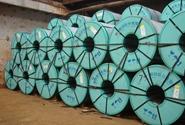Prices

January 29, 2015
Imports Contributing to “Ugly Prices”
Written by Sandy Williams
Steel imports continue to flood U.S. shores and were a priority issue for CEOs during earnings calls this month. Low cost imports are creating competition for market share as well as depressing prices in the carbon steel spot market.
Nucor CEO John Ferriola summed up the current market condition:
“The other major headwind is from the renewed surge in import activity. Full year 2014 imports of finished carbon steel products are estimated to have jumped to an unreasonable and unacceptable level of approximately 34 million tonnes. That’s an increase of about 37% over 2013 and just under 2006’s record level of 35 million tonnes. Indications are that January 2015; finished steel imports may set a monthly record of around 3.9 million tonnes.”
Ferriola told analysts that Nucor will not be deterred by the influx of imports and expects to grow market share across its range of products, higher value as well as lower commodity products.
“We’ll grow in all of the products that are out there,” he said. “We will not concede market share easily to our competitors or to import pressure. We will continue to fight. In other words, we will gain higher ground without giving up what we already have.”
Regarding a potential trade case on coated flat rolled products, Ferriola said he could not answer specifically.
“I will say that, like a general statement, that we will be proactive, and we will be aggressive. The level of import is infringing at which absolutely ridiculous levels, and we believe that there’s a potential for action coming up. We’re monitoring the situation very closely, and that we will be aggressive.”
James Wainscott, CEO AK Steel, concurred with Ferriola.
“The key to us is fair trade, fair trade as opposed to free trade,” said Wainscott “There is a huge difference. And really, we have to stand tall as an industry and as a country. Imports have to be fairly traded not dumped. We either stand for something or we stand for nothing. And I’m confident that as other economies have struggled and are continuing to struggle, they view America as the dumping ground, keeping their mills operating abroad, employing their people, shipping their excess production here. So no doubt we’ve been injured by the excessive imports.”
“Given the troubled economies outside the United States and the huge increase in their steel exports to the U.S., our attorneys are taking a hard look at whether or not a trade case should be filed. But one thing is crystal clear, we’ve been injured. Both AK Steel and the U.S. Steel industry have been significantly harmed as America has become the dumping ground for foreign produced steel. How fast we can prove injury and how quickly we can accelerate the process is key. I might add that our contract pricing is not immune and in fact, has already been hurt as well from the pricing pressures brought about by the sharp increase and lower priced imports.”
On the issue of pricing pressure, which Wainscott referred to as “ugly pricing,” he said the dramatic increase in imports was “the equivalent of having a new 4 million-ton steel mill appear roughly overnight in the domestic carbon steel market.”
“The increased supply has had a negative impact on pricing in the domestic market,” said Wainscott, “especially in the spot market. In fact, it’s put undue pressure on carbon prices and we experienced a bigger price decline than we expected in the fourth quarter of 2014 as a result. It’s off this low base that we embark for 2015.”
Import pricing has become a tool at the negotiation table says Wainscott, “I’d just say that, again, in the spirit of the dance and cooperation and so forth, clearly those who buy product see what’s happening in terms of import pricing.” He added, “They’re not shy about using all the tools at their disposal to help with their negotiations.”
US Steel President and CEO Mario Longhi was asked if there a ratio of import penetration to the U.S. market that starts to set alarm bells off in Washington.
“Well, the alarm has been sounding quite hard and we have the hammer on it all the time. We’re going to increase that noise and that sound, so there is no doubt about it. You know you have TPP efforts going on and there is a lot embedded in it that poses a condition that is not favorable. All that we want is a level playing field. And there is no question that that message is beginning to come across. We’re asking for more clarity on the part of the – the broader industry is feeling the same pain. So we’ve maintained the leadership position that we have created in order to bring forth the real facts that will help us have an opportunity to revisit the ways in which the law is prescribed today, and we need to show that the injury standards that are in place today definitely are not applicable nor appropriate for the level of trade that is taking place in this globalized environment.”







